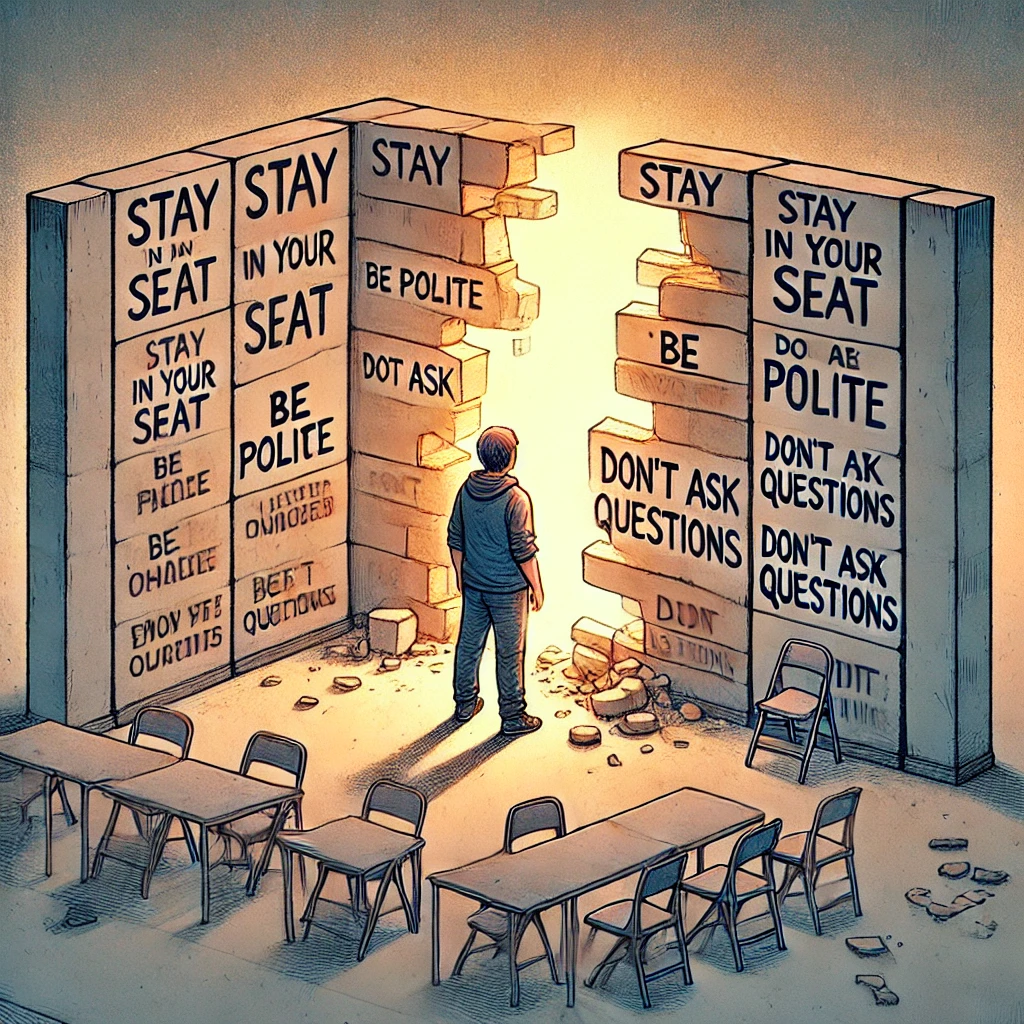“Rules and regulations do not make a person correct, they only make them consistent.” –Calvin Coolidge
——-
In coaching and change, one of the predominant questions is, “How much possibility can you see?” One of the things I consistently do is work on finding all the ways that we limit ourselves from seeing possibility.
One of them is “rules.”
—–
It’s day one of my new class in Creative Writing. I’m excited to learn. I haven’t been in a learning environment for a long time. I walk in and see there is assigned seating.
Reluctantly I take my seat. I am in the back and not able to see or hear well. The woman next to me is chatty. When the class begins, she keeps saying things to me under her breath or sometimes directly. When she is confused, she asks me questions. I respond to her because I don’t want to seem rude. I raise my hand to ask something, but the teacher does not see me. This happens day after day – the chatty woman, the back of the room, the teacher often not noticing me.
I want to bring my computer and take notes on it, but everyone else has a notepad. So I don’t.
———–
Rules. All the rules – seen and unseen. Considered and unconsidered. Known and unknown. Rules we learn in childhood. Rules we make up because we are nervous. Rules we learn in our particular society or culture. All the rules. What do the rules do for us? What do they keep us from?
Let’s go back to my story. What are all the rules I made up?
1. When a seat is assigned in a class environment, it is my seat and I cannot move from it.
2. When the person next to me talks to me, I need to answer. It would be rude not to and rude is not cool.
3. Before I speak in a classroom environment, I must raise my hand.
4. I have to sit in the same seat tomorrow that I was assigned today.
5. I cannot bring my computer and take notes that way.
What do you think when I articulate these “rules?” Which are obvious and which are less so? Some will likely resonate with you personally. Some you will see as made up and may think that’s ridiculous.
Some of these are based on my sense of “politeness.” What it means to be polite, and the fact that I need to be polite are rules that are inherent to me. Meaning not everyone has my particular rules. I personally was raised to believe “politeness” is important. What if I asked to sit in a different seat so I could see and hear better? What stops me from asking? What if I said to the person next to me, “I am trying to listen. Please don’t talk to me.” Why don’t I?
Some rules might be more conscious than others. Maybe if I come in tomorrow and sit in the same seat, I have made up a rule without consciously knowing about it. I just go to the seat day after day, not enjoying it, but also not consciously asking myself why.
When I decide not to bring my computer, this may have been invented more consciously. I looked around the room to guess at what the “rule” is.
Rules tend to make us feel safer. Because they are consistent over contexts and because they are largely unexamined, they limit our sense of what is possible. And they often do not reflect our true selves. In fact, they are often directly in conflict with us expressing our true selves. If I think it is rude to speak without raising my hand, I will not. If I think it is impolite or disturbing the “peace” to ask if I can speak without raising my hand, then I won’t ask about the rule. But I still have something to say.
What to do?
Because so many rules are unconscious, it can be difficult to see them. One way to start seeing them is in places where you don’t have what you want (ex: I am in the back of the class and I don’t want to be there) and in those scenarios, ask “what rules am I making up?” Or maybe ask, “what would I do if there were no rules?” This will help you see your rule. You might answer, “if there were not rules, I would just move.” This will help you see that for some reason, you have invented the rule that you cannot change seats. Now it is conscious and you can work with it. You can continue to adhere to it. Or you can ask about it. Or you can just move. You have choice. You can see possibility.
Another way to discern your personal rules might be to watch other people and ask yourself what rules they are making up. It can be easier to see other people’s rules than our own. Then ask yourself if you have similar rules.
Rules limit your expression in this world, and they also limit you in getting what you want. It behooves you to start looking for them.
This is part of what Anais Nin likely meant when she said, “We don’t see the world as it is, we see it as we are.”







